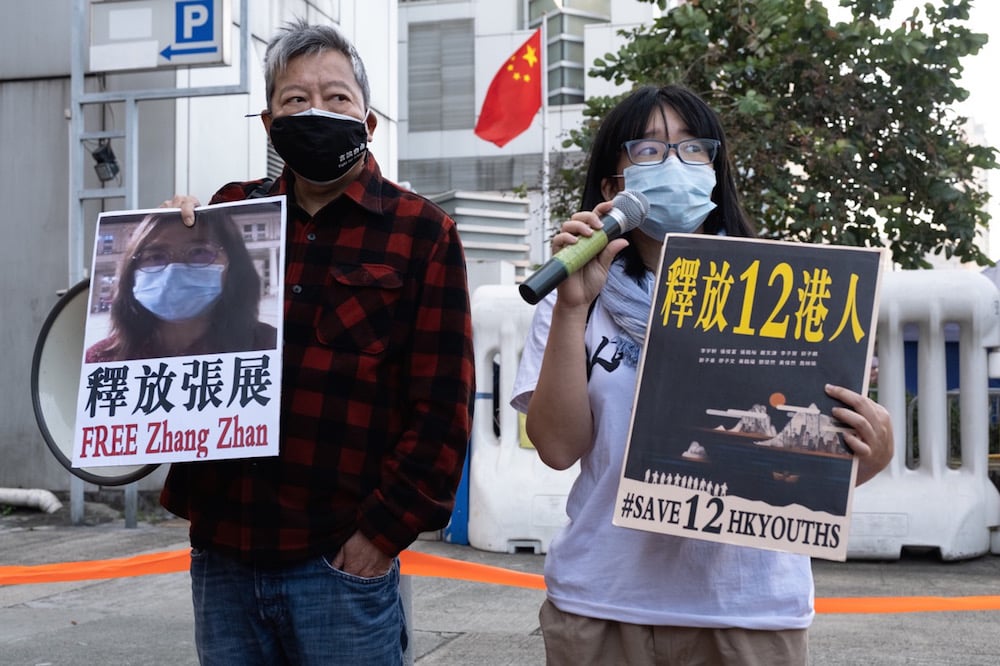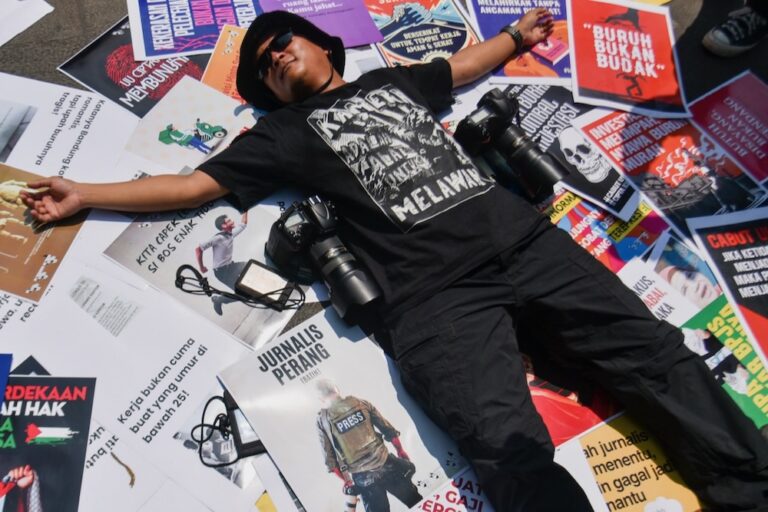September 2021 in Asia-Pacific: A free expression round up produced by IFEX's regional editor Mong Palatino, based on IFEX member reports and news from the region.
Two alternative media websites were targeted by cyberattacks in the Philippines, while an independent news website was forced to stop operating in Singapore. Human rights groups call for the humanitarian release of lawyer and journalist Zhang Zhan in China. A landmark court ruling in Sri Lanka led to the disqualification of an official based on evidence obtained through the Right to Information Act.
Landmark Right to Information victory in Sri Lanka
Free Media Movement, a member of the IFEX network in Sri Lanka, organized an online forum ahead of the International Day for Universal Access to Information (IDUAI), where several civil society groups spoke about how the Right to Information (RTI) Act has been an essential legislation in defending the rights of citizens.
The forum provided a platform to mark the historic court ruling that made use of the country’s RTI law to remove an elected politician. The court decision, announced on 13 September by the Moneragala High Court judge, ordered the removal of the Sri Lanka Podujana Peramuna Monaragala Pradeshiya Sabha candidate – based on information obtained through the RTI law that the official had bribed voters. It was deemed the first victory over election fraud using the RTI Act.
To learn more about IDUAI and how access to information can help build strong institutions, we invite you to listen to the special edition of our Africa Brief podcast, which features the views of Gilbert Sendugwa from the Africa Freedom of Information Centre and Lamin Jahateh from the Gambia Press Union.
Malaysia’s new government asked to uphold freedom of expression
Civil society groups are urging the new Malaysian government headed by Prime Minister Ismail Sabri Yaakob to prioritize reforms that will promote and protect freedom of expression. They noted the intensified persecution of critics in the past 17 months when former Prime Minister Muhyiddin Yassin was in power. The CSO Platform for Reform is particularly demanding an urgent reinstatement of the moratorium on the Sedition Act 1948 and its immediate repeal.
“Its use is open to selective investigation, prosecution and abuse. This creates a chilling climate of fear hindering citizens from exercising their constitutionally guaranteed freedom of speech and expression, signalling a government’s downward spiral into an authoritarian state.”
This year alone, civil society groups have monitored at least 17 cases involving 37 individuals who faced investigations under this “archaic and repressive law.” Among those summoned by authorities were organizers and participants of #Lawan (fight) protests which criticized the government’s pandemic response. Groups like IFEX member the Centre for Independent Journalism urged the government to respect freedom of expression in dealing with the public health emergency:
“COVID-19 must not be used as an excuse to suppress dissent and public criticisms, in fact it is even more relevant in crises like this to uphold the exercise of rights by the people.”
Singapore: Defamation suit, website closure, and bill against ‘foreign interference’
September in Singapore saw several worrying developments. First, the High Court awarded damages in a defamation suit won by Prime Minister Lee Hsien Loong against journalists Terry Xu and Rubaashini Shunmuganathan, who had published allegations made by the siblings of the Singaporean leader. Xu is the editor of the alternative news website The Online Citizen (TOC).
Next, TOC was forced to temporarily close its website and social media accounts, after its license was suspended by the government for alleged failure to reveal its foreign funders. Xu described the government actions as “nothing more than means of harassment and intimidation of the free press in Singapore.”
“The licensing regime is simply meant to strike fear in the minds of the would-be donors and subscribers to prevent them from supporting independent journalism in Singapore,” he wrote on Facebook.
On 13 September, the government presented its proposed Foreign Interference (Countermeasures) Act, which would enable authorities to brand a media outlet as a ‘foreign agent’ and censor its content. Reporters Without Borders (RSF) has warned about its repercussions:
“This bill institutionalises the persecution of any domestic entity that does not toe the line set by the government and ruling party, starting with independent media outlets. As it stands, this utterly Kafkaesque project contains within it the seeds of the worst totalitarian leanings.”
But at least there was one positive story to celebrate in September. New Naratif was cleared of all allegations by the Attorney-General’s Chambers, following a lengthy investigation by the police. In 2020, the prime minister’s office had accused the news website of violating election laws when it boosted Facebook posts during the election campaign. New Naratif is now demanding an apology from the government.
Source of cyberattacks against media traced to Philippine army
The Philippine government’s Department of Information and Communication Technology has confirmed that the Distributed Denial of Service cyberattacks on the websites of two alternative media organizations, Bulatlat and AlterMidya, have been traced to the Internet Protocol address assigned to the Philippine Army. Following this revelation, the Freedom for Media Freedom for All coalition has issued a statement condemning the actions of the army as an assault on press freedom:
“We call on our soldiers to cease forthwith this insidious campaign to silence media and its members; to limit citizen access to views and perspectives that may differ from those held by the government in power. The Philippine Army should demonstrate respect for press freedom in deeds as well as in words.”
Sexist language: “Raater Rani” social media campaign in Bangladesh
A feminist network in Bangladesh has initiated a social media campaign to protest the use of sexist language and moral policing in the media and society. Meye Network name the campaign ‘Raater rani’ , after a flower of the “queen of the night” cactus – epiphyllum oxypetalum – that usually blooms once in a year, during the night, and wilts at dawn. The word has become synonymous with ‘prostitute’ because of deliberate misuse in misogynistic narratives. Similar to the #MeToo hashtag, the ‘Raater rani’ campaign inspired women to share stories of abuse and discrimination.
New & noteworthy
Several IFEX members have released reports abut the state of digital media in Pakistan.
A report from Bytes for All maps Pakistan’s internet landscape highlighting digital trends and their impact on socio-economic developments, as well as challenges and threats in the digital age in the past two years.
Digital Rights Foundation has released the results of a survey it conducted about the impact of increased digitisation across the country in wake of the Covid-19 pandemic. It looked into the issues of digital divide, privacy, and the impact of disinformation.
The International Federation of Journalists has confirmed in three separate digital media studies that digital media workers in Pakistan are largely ignored both in terms of working conditions and in meaningful participation in unions and press clubs.
In brief
In Kashmir, the homes of four journalists in Srinagar were raided by the police on 8 September. They were held for a day and questioned about their links to a website that allegedly publishes content that threatens journalists and activists.
In Australia, the Media, Entertainment & Arts Alliance has written to the police about at least four incidents where journalists were harassed and detained while covering a protest in Melbourne.
In Bangladesh, the Dhaka Cyber Tribunal accepted Digital Security Act charges against Kabir Kishore, a cartoonist; Tasneem Khalil, editor of the Sweden-based news website Netra News; and Shafiqul Islam Kajol, a photographer and editor with the Daily Pakkhakal magazine. These journalists have published reports criticizing the pandemic response of the government.
In China, IFEX joined other civil society groups in calling for the humanitarian release of human rights defender, journalist, and former lawyer Zhang Zhan. She was arrested in 2020 after reporting about the early days of the coronavirus situation in Wuhan. Her health has deteriorated in recent weeks after she insisted her innocence through a hunger strike in prison.



